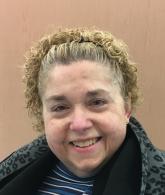In remembrance of Annie
I met Annie in 1999 when she moved into my previous nursing home. For the first couple months, she was quiet and pretty much stayed to herself. The restorative aides told me she was lonely and feeling down. They asked if I could spend some time with her. They felt since she and I were the same age, we might have things in common.
I knew moving into a facility was not easy, so I tried to help Annie get accustomed to the place. Annie shared that she had two sons: one was in his 30s, married with a daughter, and a younger one who was just 18. When her youngest son was five, she had a stroke that paralyzed her on her left side.
She had lived on her own until osteoporosis pain, bone fragility and depression required her to move into a nursing home. She told me she never wanted to be a burden on her children. Annie had been a nurse aide and knew what that job required.
The aides were right. Annie and I had much in common living in the same nursing home. We spent time together and helped each other. She told me her problems, and I told her mine.
Annie knew who drove each of the cars in the parking lot. She would get me to sit outdoors with her when the weather warmed in the spring. I would spend an hour out there, and she spent most of the day in the sunshine. She was as brown as a dewberry by Memorial Day.
For a while at activities afternoon snack, Annie fed me so I did not have to wait until last. Occasionally, we went to the dining room where she got coffee, and I got tea. We acted like a couple of coffee klatchers. Spending time together made life a bit more normal.
On Sept. 11, 2001, Annie was terrified of war and feared for her children and grandchild. Even though the day was overcast, I coaxed her outside. I tried to convince her the best thing to do was live in the present moment because that is all any of us has. Annie told me how much she missed her sisters in Tennessee and in that she would love to visit them. I encouraged her to plan a trip.
A few weeks later, she and her son drove to Tennessee to visit her sisters for five days. After that, I encouraged her to go out more often. Her older son took her to his home where she sometimes stayed overnight. I told her she might be independent enough to be able to move out of the nursing home. She disagreed. But over the following months she became more independent and comfortable with outings.
By early summer 2003, we were getting her gifts for her senior apartment. She moved to a complex several miles away in July. I thought I would keep up our friendship by calling and visiting, but talking on the phone was not comfortable for us. I sensed Annie was not telling me how she was really doing. A couple of times, I heard real fear in her voice. I knew the day-to-day happenings at the facility were not of interest, and I did not want to burden her with my troubles. At some point, I stopped calling. I never did visit.
I was told Annie was moving back in 2008. When she did, she blended right in. We quickly resumed our friendship. It was as though she had never been gone. I was president of Resident Council, and she helped each month to cajole residents into attending. She was always there, close to the door, keeping track of what was happening.
The nursing home made some changes in 2010, and Annie was moved to the other unit. That greatly upset her, and she acted like a captured animal. She even lashed out at aides because she was so fearful. I visited her daily to help her adapt, but I could tell she was shaken.
When I was involuntarily discharged, I gifted her with my bedspread and draperies for her room. I felt like I was deserting her, but I asked Megan, an aide friend, to look out for her. I stayed in touch by e-mailing Megan, who read my notes to Annie. I last heard Annie’s quiet voice when they called me on my birthday in 2015.
Megan called again a couple weeks ago on a Saturday evening. We exchanged pleasantries, but there was a deadly silence. I asked her if she was still working at the same facility. She said she was. When I asked if Annie was still there, Megan paused and said that was why she called. Annie passed away on Mother’s Day.
Annie got up as usual to get herself ready. A little while later, a housekeeper found her unresponsive in her room. They think a stroke or heart attack ended her life. Megan told me Annie wanted to be cremated and requested there be no funeral. I was thankful Annie had not suffered or been confined to bed before she died.
Annie’s innate curiosity and interest in others kept her involved with the staff and residents. I know Annie touched the lives of many staff and residents during her stay. I am pleased Annie came into my life.

Kathleen Mears is a long-time blogger who has been a nursing home resident for 21 years. She is an incomplete quadriplegic and uses a power wheelchair to get around. Her computer is her “window on the world.” This blog shares her thoughts and view of life as a nursing home resident as well as ideas of how it might be improved in the future.
Related Articles
Topics: Articles , Resident Care












